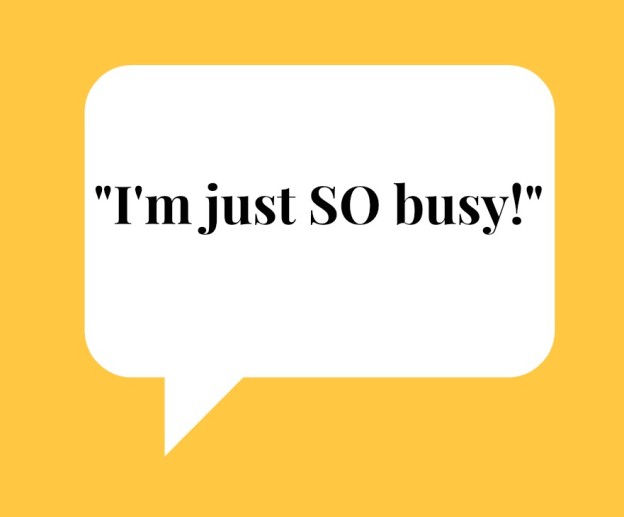Here’s a thing I’ve literally never understood in the period of time I’ve been working: everyone runs around all the time talking about how busy they are. OK. So maybe they are. There is this idea that we live in a period of time where business is “moving faster than ever,” so maybe it’s possible that everyone is so busy. OK. Deep breath.
But then my lack of understanding starts to creep in. You see, everyone is different. So if you give two people the same project or task, one of them can probably finish it in 1 week. The other person might need 4 weeks. So isn’t how “busy” you are in part a function of your job skills, time management skills, and personal choices about what to focus on?
Right. Right?
The ‘busy trap’ stuff confounds me so much that I write about it all the time, including:
- Being busy is akin to a drug for many people
- Only about 10 percent of Americans even know how to balance ‘busy’ and ‘happy’
- Why does everyone feel the need to talk about how busy they are?
- What exactly is making you so busy?
And now, we have some new research to throw into the fray.
There’s a center at Oxford with over 850K time diaries, and they — as you might imagine — do research on how people use their time. That link right there is an article from Nature, which is in turn summarized in Fast Company. Here’s the part to focus on:
A study that compared modern time diaries to ones the BBC collected in 1961 found, per the Nature article, that “Men had reduced the number of hours they spent on paid work, increased those in unpaid work, and overall came out ahead, with just under 50 minutes more free time per day. Women were doing more paid work” — reflecting the fact that many more women work for pay now than in 1961 — “and less unpaid work, producing little change overall.”
The article continues: “All in all, there is little support for the idea that everyone is working harder than ever before.”
Read that last part again. There is little support for the idea that everyone is working harder than ever before.
Want one more piece of evidence here? 40 hours of work in 1950 could be achieved in about 11 hours/week in 2015.
Yes, yes, yes — we get it. Things are moving so fast! There’s so much technology! Our margins are tight! Our industry could be disrupted!
Yes. There are challenges and things can seem overwhelming. But in reality, this is probably the picture (via Fast Company again):
Finally, though, the sheer volume of modern distractions may make life feel busier than it is. Constantly trying to do two things at once means you can feel pulled in multiple directions. You can be working a regular 40-hour-per-week job, and check work email five times at night while eating dinner or watching TV. At just two minutes at a pop, that adds a mere 10 minutes of work, but can pollute whole hours.
Yep. Here’s the thing people don’t realize: your entire life is basically “push” vs. “pull.” E-mail came into our world at the sweet spot of that intersection. You see an e-mail and you assume it needs to be read, and dealt with, right then. That’s “push.” Social media notifications and stuff on your phone works the same way. You want to see what’s there. That distracts you from your main focus. It makes you feel busier. Remember: for all the middle managers who run around screaming about how much they’re multitasking, the concept of multitasking is essentially a myth.
Here’s what I’d say about people talking about how busy they are:
- They don’t manage their time well
- They don’t understand their priorities, which probably comes from their manager
- They get distracted easily
- They confuse “busy” with “I’m relevant”
- They’re not generally productive
- They view busy as a status symbol, or currency of the modern age
- They don’t understand push vs. pull
- Everyone else is saying they’re busy, so they want to fit in
- They’re not actually busy, but worried they will get a ton more work if they admit that
Any other reasons you’ve seen?

Reblogged this on Gr8fullsoul.